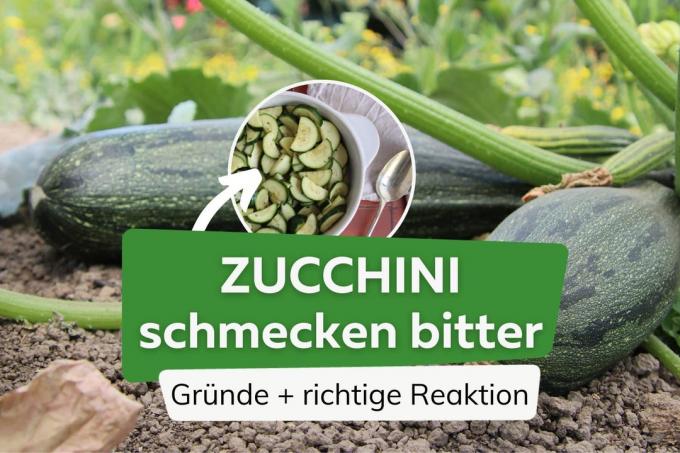
If zucchini unexpectedly tastes bitter, the enjoyment is completely ruined. But your own health can also be in danger, because bitterness is never a good sign with this tender vegetable.
In a nutshell
- bitter zucchini contain toxins
- do not eat, dispose of completely immediately
- severe to fatal poisoning possible
- Only use purchased, bitter-free seeds in the home garden
- Dark fruits, cool at 10-15 °C and max. store for a week
Table of contents
- Never eat bitter zucchini
- Bitterness hint at toxins
- Typical poisoning symptoms
- Increased risk in the hobby garden
- Identify bitter zucchini early
- Store zucchini properly
- Cultivate zucchini "stress-free".
- frequently asked Questions
Never eat bitter zucchini
If you notice an unpleasantly bitter taste in a meal of zucchini, stop eating immediately. Also, spit out whatever is in your mouth. Discard all of the food because bitter zucchini is a health hazard.

Bitterness hint at toxins
All zucchini plants, regardless of variety and color, can, under certain circumstances, produce a toxic plant bitter substance called cucurbitacin. It is a plant's own defense substance with which the courgettes arm themselves against various disturbances. Cucurbitacin is contained in the peel and pulp and is extremely resistant:
- not water soluble
- heat resistant
- frost resistant
These properties make it impossible to wash out the toxins or destroy them by cooking or freezing.
A notice: If a zucchini dish only tastes slightly bitter, don't try to mask the bitter taste by adding spices. Because the toxins remain and can lead to poisoning.
Typical poisoning symptoms
Even small amounts of cucurbitacin can cause these nagging symptoms:
- stomach cramps
- Diarrhea
- nausea
A higher concentration can cause severe, long-lasting and even fatal poisoning.

A notice: If a zucchini plant suffers heat and drought stress, it activates the production of bitter substances. Zucchini that has been harvested healthily and is free of bitter substances can subsequently become bitter if they are stored too long or too cool.
Increased risk in the hobby garden
The toxic bitter substances have long been bred out of the commercially cultivated varieties. Therefore, optimally stored zucchini from the supermarket are hardly affected. The garden varieties are now also considered to be free of bitter substances. Nevertheless, they can produce toxins in the hobby garden, since it is easier to crossbreed with others here cucurbits can come.
Identify bitter zucchini early
Zucchini should taste mild and slightly nutty. Chew up a small piece, washed but not yet seasoned. If you notice even a hint of bitterness, spit it out and discard the entire zucchini. Even if just the skin of a zucchini tastes slightly bitter, the whole fruit can be poisonous.
Tip: Zucchini with a bitter taste can already be peeled or peeled. Cutting give off an unusually unpleasant, musty smell. In this case, a taste test is no longer necessary, they should be disposed of immediately.
Store zucchini properly

Always harvest young zucchini that are about 15 to 25 cm long. When buying, you should look for a shiny and undamaged shell that only slightly gives in to light finger pressure. Ideally, use the zucchini immediately. Storage should be an exception. Proceed as follows:
- store immediately
- in dark and cool place
- Temperature values between 12 and 15 °C are ideal
- do not exceed the maximum storage time of one week
Tip: Even brief storage under ideal conditions is no guarantee that courgettes will not taste bitter. In the case of purchased copies in particular, it is not known what path they have already taken. So always do a taste test.
Cultivate zucchini "stress-free".

You can minimize the risk of bitter substance formation with these measures:
- warm, sheltered location choose
- without summer heat build-up
- Young plants ideally behind glass prefer
- do not plant out until mid-May
- protect from the cold with fleece or foil tunnels
- water regularly when dry
- do not hoe, carefully pull out weeds with your hands
frequently asked Questions
Do not collect seeds from your own plants. Instead, use certified commercially available seeds for each sowing. Only accept gift seedlings if you know for sure which seed was used.
Try one of the first cotyledons. If a slightly bitter taste can already be guessed, you should save yourself the trouble of cultivation or use it instead. get other seedlings. Seedlings that don't taste bitter are probably fine, but again, there are no guarantees.
All cucurbits can produce toxic cucurbitacin. These include, for example cucumbers, squashes and melons. That's why you should first try these fruits unseasoned before eating them or processing them.
All zucchini fruits contain "inactive" toxins. When dormant, they are harmless to humans. Long storage reactivates these toxins. This will make the zucchini taste increasingly bitter.


